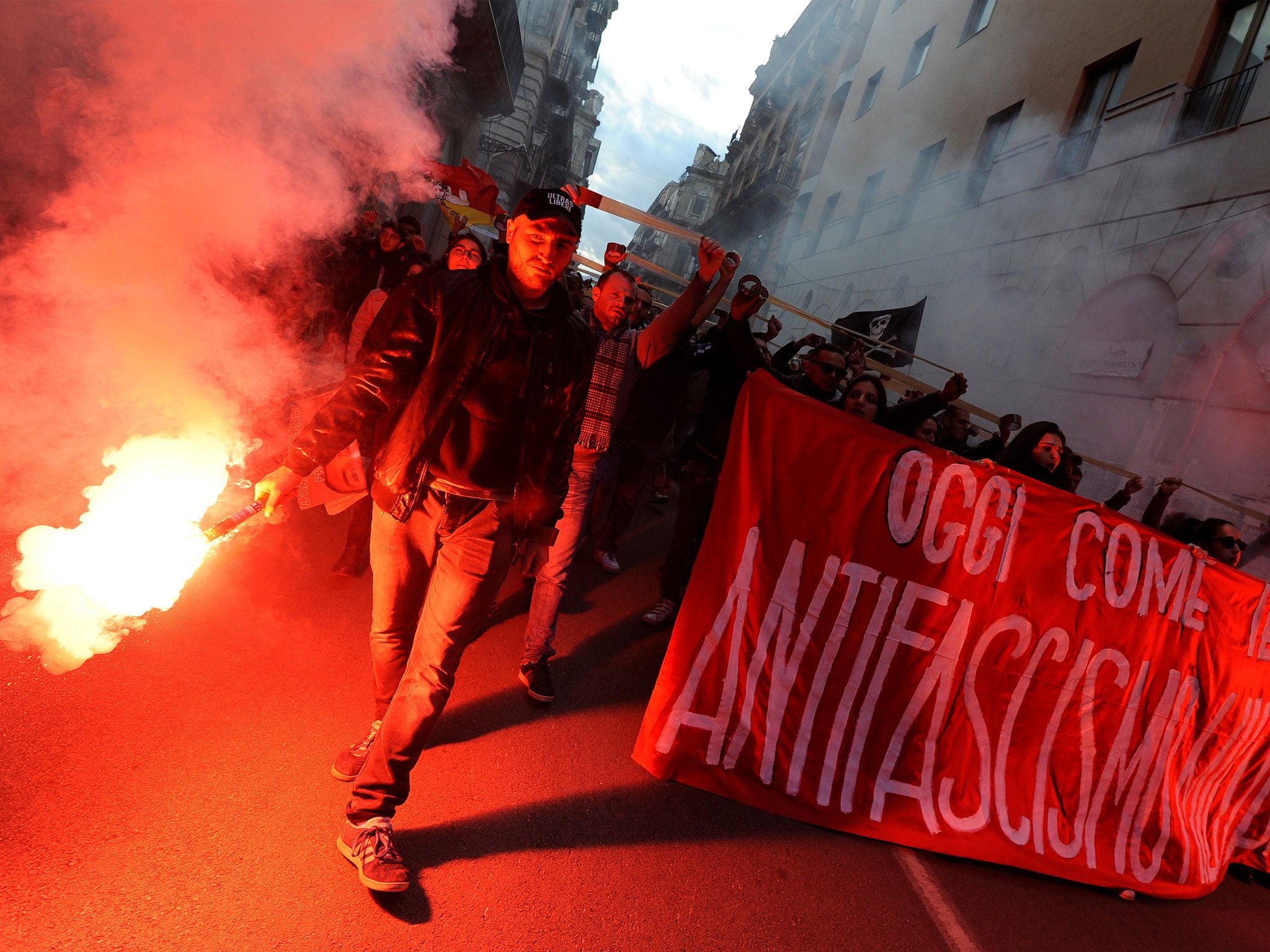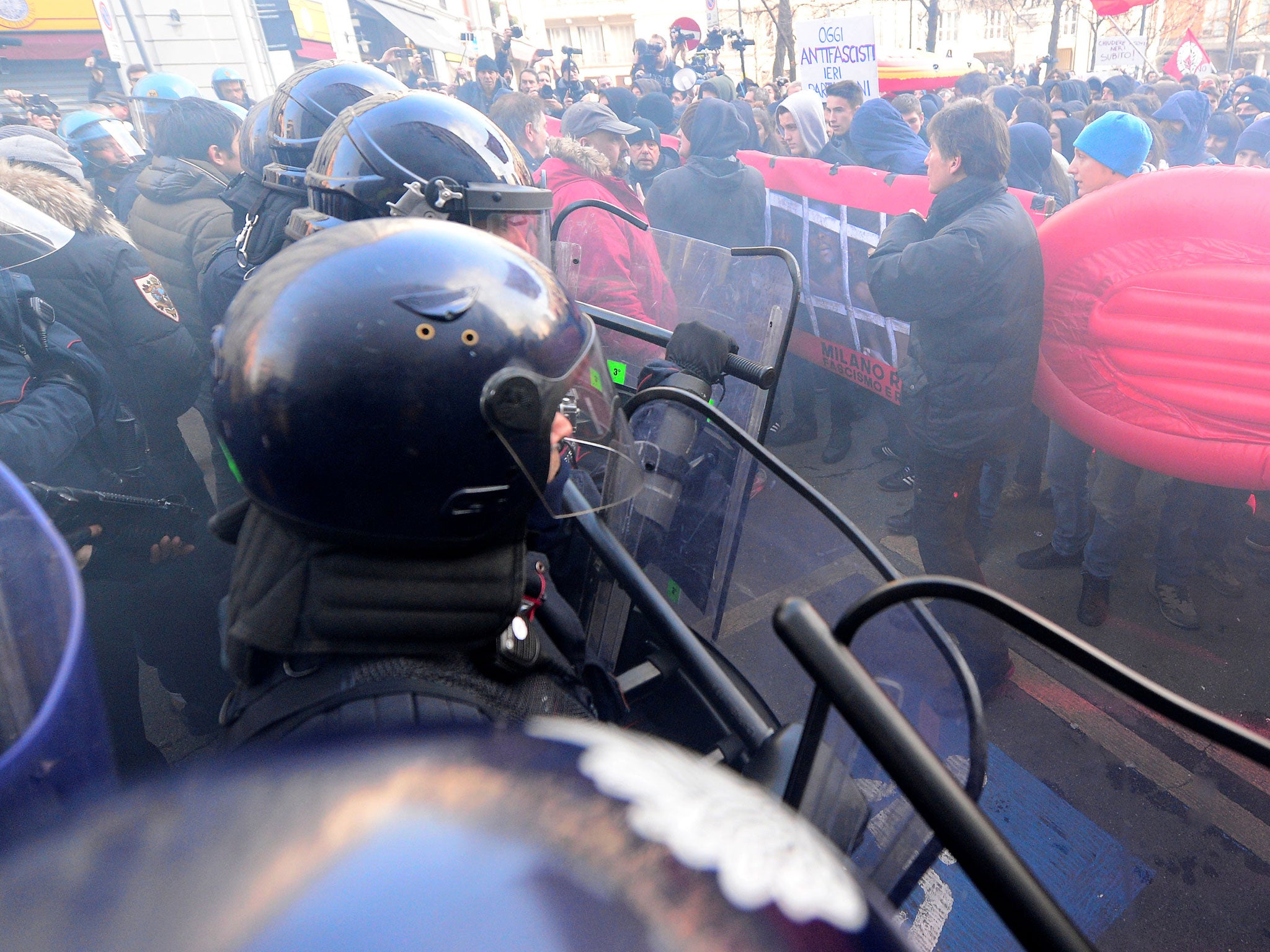Italy election: Anti-fascist and far-right protesters clash in campaign rallies before March vote
Demonstrators hold at least a dozen marches in several cities

Your support helps us to tell the story
From reproductive rights to climate change to Big Tech, The Independent is on the ground when the story is developing. Whether it's investigating the financials of Elon Musk's pro-Trump PAC or producing our latest documentary, 'The A Word', which shines a light on the American women fighting for reproductive rights, we know how important it is to parse out the facts from the messaging.
At such a critical moment in US history, we need reporters on the ground. Your donation allows us to keep sending journalists to speak to both sides of the story.
The Independent is trusted by Americans across the entire political spectrum. And unlike many other quality news outlets, we choose not to lock Americans out of our reporting and analysis with paywalls. We believe quality journalism should be available to everyone, paid for by those who can afford it.
Your support makes all the difference.Police have clashed with protesters in Italy as antagonism flared between anti-fascist and far-right activists in a violence-marred election campaign.
In the last weekend for political rallies ahead of Italy’s 4 March national election, protesters held at least a dozen marches or rallies on Saturday in several cities.
Italy’s northern powerhouse, Milan, saw far-left demonstrators clash with police trying to block them from reaching a far-right rally. Police in riot gear wielded batons against the front line of protesters to drive them back.
In Rome, a march drawing Paolo Gentiloni, Italy’s Prime Minister, and other ministers in his centre-left government deplored racism and the revival of fascist ideology.
At the Piazza del Popolo – or People’s Square – about 100,000 people gathered to the cry of “never again fascism” with the aim of standing up against the far-right.
“I’m worried about this fascist and racist revival,” said Carla Nespolo, the president of the National Association of Italian Partisans. “I don’t think we should panic, because there’s an overwhelming majority of anti-fascist people, but we need to be united in providing a barrier against xenophobia and fascist nostalgia. This isn’t only an Italian problem: the loss of historical memory concerns Europe in general; 60,000 fascists appeared in the streets of Warsaw on 11 November. It is crucial to be conscious of the risks of a return of fascism”.
“We see fascist groups taking roots in schools”, said Giammarco Manfreda, a spokesman for a popular high school student union. “At least one thousand students came to the anti-fascist rally from all over the country. We ask for a courageous stance; it is inconceivable that the neo-fascist leaders are still allowed to compete for votes.”

Across town, another march protested against government labour changes that made it easier to lay off workers.
Justice Minister Andrea Orlando warned that fascism “is a danger in Italy and Europe. And also dangerous is the underestimation of this phenomenon”.
Elsewhere in the Italian capital, protesters denounced the government’s decision to make several vaccines mandatory for schoolchildren, another issue inflaming campaign debate. Campaigning officially ends on 2 March.
Opinion polls indicate a hung Parliament could result, with three blocs, each short of an absolute majority: the centre-left, the centre-right and the populist 5-Star Movement.
Italy’s election campaign took a violent turn on 3 February, when an Italian man in the central town of Macerata opened fire on African migrants, wounding six of them.
The suspect, who once ran in a local election for the anti-migrant League party, has said he was avenging the death of an Italian woman allegedly murdered by African migrants.
In Milan yesterday League leader and premier candidate, Matteo Salvini, denied that his followers advocated violence. Instead he denounced what he called “this angry anti-fascism” and declared fascism a dead ideology.
The Italian constitution bans revival of fascism, the ideology of dictator Benito Mussolini before and during the Second World War.
League marchers held a banner with Mr Salvini’s slogan “Italians first”.
Opinion polls indicate many Italians blame migrants for crime.
The League, along with the 5-Star Movement, contends that foreigners, by working for less pay, rob Italians of work.
In Rome, police stopped chartered buses bringing demonstrators to the city, opening participants’ backpacks and searching vehicles to ensure that clubs or other weapons were not hidden.
Three Milan underground stations were closed as a precaution near Mr Salvini’s rally, near a rally by the far-right CasaPound group and near an anti-fascist gathering.
A few blocks away from Rome’s anti-racism march, thousands of unemployed people from the south, metal workers, far-left youth social clubs and advocates for public housing marched to protest the government’s labour reforms.
Tensions were high in Palermo, Sicily, where days earlier the local leader of the far-right Forza Nuova party was beaten up on a street.
Some shops closed early on Saturday, fearing participants in an anti-fascist march would clash with those attending a Forza Nuova rally but the anti-fascist march proceeded peacefully.
Forza Nuova national leader Roberto Fiore, leading a campaign rally in Trieste, northeast Italy, blamed “this campaign of hatred” on far-left forces. Mr Fiore rejects the label of neo-fascist, saying instead he is fascist.
In Florence, a 17-year-old boy was fined when police noticed him ripping off campaign posters of the right-wing candidate for premier, Giorgia Meloni.
Just days ago, two youths were slashed when they were affixing posters for a tiny, far-left party.
Join our commenting forum
Join thought-provoking conversations, follow other Independent readers and see their replies
Comments